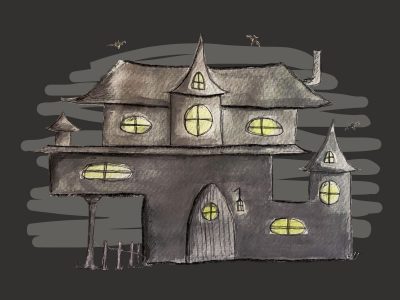My first encounter with horror came without warning. For one of my early birthdays, my grandpop gave me a massive book all about the history of cinema — imagine me as a loud, tiny creature who was elated to receive such a perfect gift.

As fate would have it –– I flipped it right open to the page about “The Exorcist,” which featured an iconic image of a possessed Linda Blair with her head twisted all the way around. I did not care about iconography, though. I was so frightened I begged my parents to return the book to wherever it came from –– worried about the evil it held.
I realize now that my reaction was excessive, but this occurrence is indicative of the true strength horror wields –– it scares those who engage with it –– but it can also fascinate them and pave the way for further exploration into the genre. That exact power compelled me to become the horror enthusiast I am today.
However, it is very easy to be dismissive of horror, especially if the genre is broken down to its most unfortunate elements: irritating jumpscares, endless sequels with an absence of creativity and gratuitous cruelty that exists solely for shock value.
While any critiques pertaining to these issues are valid, there is so much more to admire about horror as a whole, especially when so many of the greatest works in the genre embrace an attitude of subversion towards these points of contention.
As a deeply transgressive genre, for example, horror contains a sincere knowledge of what it is like to be an outsider — granting anyone who has ever been made to feel that way a sense of representation that is difficult to find in their daily lives.
Consider, for instance, Brian De Palma’s electrifying 1976 film “Carrie,” based on Stephen King’s equally chilling debut novel. As a subject of harsh bullying, the titular character feels forced to suppress her emotions in order to fit in with the same community that ostracizes her, a friction which inevitably boils over in the film’s blood-soaked climax.
Horror often aligns with subjects who are prevented from being their authentic selves by others, providing amplified depictions of distress and isolation that viewers can connect with on a more personal scale. A modern example of this type of portrayal would be Ti West’s “Pearl,” a film centered around a lonely farmhand whose desire to become a star pushes her to violent measures.
Both “Carrie” and “Pearl” refuse to trap their characters into confined spaces, which is reflective of what I love about horror. Much like our own emotions, horror films are often complicated and messy, granting an artistic catharsis in the form of uninhibited carnage and chaos.
In the same regard, horror not only allows its heroes to defeat any number of evil villains, but it gives them agency over how they reckon with the trauma they have experienced.
For example, Sidney Prescott — the protagonist of the “Scream” franchise — overcomes a lot of brutality and personal losses with an inspiring amount of determination. In fact, some of the series’ most memorable scenes focus on the life Sidney has built for herself in spite of all she has suffered through.
Through David Cronenberg’s contributions to the craft and recent films like Julia Ducournau’s “Titane,” horror also unflinchingly charts the damage that can be done to our own bodies. While this exploration can turn exploitative in the hands of an unsympathetic filmmaker, the finest media in the body horror subgenre recognizes how to prioritize empowerment and rapturous transformation instead.
I find horror films to be a wonderful merchant of empathy and understanding. Even through all the gore and terror, they still serve as a way for viewers to feel seen and heard, as well as supplying some much-needed escapism every now and then.
As Halloween approaches, I highly recommend making some popcorn, turning off the lights, and diving into a horror film or two — they might be scary, but they could also lead to a new appreciation of what the genre has to offer.





















































































































